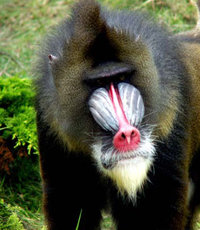Mandrill
|
|
| Mandrill Conservation status: Vulnerable | ||||||||||||||
|---|---|---|---|---|---|---|---|---|---|---|---|---|---|---|
 | ||||||||||||||
| Scientific classification | ||||||||||||||
| ||||||||||||||
| Binomial name | ||||||||||||||
| Mandrillus sphinx F. Cuvier, 1807 |
The Mandrill (Mandrillus sphinx) is a primate of the Cercopithecidae (Old-world Monkeys) family, closely related to the baboons and even more closely to the Drill. The Mandrill is the world's largest monkey species. The word mandrill means man-ape.
Mandrills are recognized by their olive-colored fur and colorful face and rump amongst males (color will grow stronger with sexual maturity); females have duller colors. Males can weigh up to 60 lbs (30 kg), females about half as much. They grow to be about half a meter long (20 inches) and can survive up to 25 years in captivity.
Mandrills are found in the tropical rain forests of Equatorial West Africa (South Cameroon, Gabon, and Congo).
Mandrills are social creatures and may be found in groups ranging from 5 to 50 individuals, led by an older dominant male.
Mandrills are omnivores and acquire their food by foraging (mainly plants, insects and smaller animals) from the ground as they are terrestrial, although they may climb trees occasionally to sleep. Their main natural predators are leopards and cheetahs. Because of over-hunting by humans, the Mandrill has become endangered. The situation is exacerbated by deforestation causing Mandrill habitats to disappear.
The gestation (pregnancy) time for Mandrills is 6-7 months and young are usually born in Jan-April. However, Mandrills mate throughout the year during the estrus cycle, which occurs once every 33 days.
Although the Mandrill does not hunt larger prey, it is well adapted to fighting and is not to be provoked.
Reproduction
Courtship
During courtship, the male will walk after the female as the female leads with her tail in the air. The male will then make little courtship noises, baring his teeth and vocalizing softly. If the female likes what she hears she will present, which means she will bend down, head to the ground, rear in the air and will wait for the male. The male will mount her and they?ll commence copulating. After copulation, the female will depart and both she and the male will finger their respective genitals and sniff and lick their fingers.
Parenting
Mandrill infants are born with their eyes open and with fur. They have a black coat and pink skin for the first two months. They cling to their mother's belly immediately and can support their own weight. Mothers form bonds with their children. These bonds last into adulthood with the daughters, while the bonds with the sons last only until his sexual maturity. These bonds entail the two sitting with each other and grooming each other.
